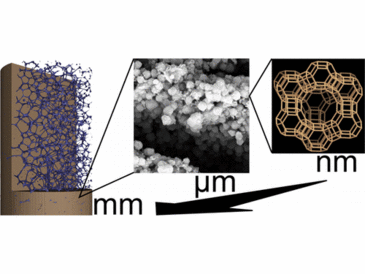Benjamin Besser, Henrique Akira Tajiri, Gerd Mikolajczyk, Jens Moellmer, Thomas C. Schumacher, Stefan Odenbach, Roger Glaeser, Stephen Kroll and Kurosch Rezwan.
ACS Applied Materials & Interfaces (2016) 8, 3277-3286.
Porous adsorbents with hierarchical structured macropores ranging from 1 to 100 mu m are prepared using a combination of freeze casting and additional sacrificial templating of polyurethane foams, with a zeolite 13X powder serving as adsorbent. The pore system of the prepared monoliths features micropores assigned to the zeolite 13X particle framework, interparticular pores of similar to 1-2 mu m, lamellar pores derived from freeze casting of similar to 10 mu m, and an interconnected pore network obtained from the sacrificial templates ranging from around 100 to 200 mu m with a total porosity of 71%. Gas permeation.measurements show an increase in intrinsic permeability by a factor of 14 for monoliths prepared with an additional sacrificial templated foam compared to monoliths solely providing freeze casting pores. Cyclic CO2 adsorption and desorption tests where pressure swings between 8 and 140 kPa reveal constant working capacities over multiple cycles. Furthermore, the monoliths feature a high volumetric working capacity of similar to 1.34 mmol/cm(3) which is competitive to packed beds made of commercially available zeolite 13X beads (similar to 1.28 mmol/cm(3)). Combined with the faster CO2 uptake showing an adsorption of 50%-within 5-8 s (beads similar to 10 s), the monoliths show great potential for pressure swing adsorption applications, where high volumetric working capacities, fast uptakes, and low pressure drops are needed for a high system performance.


